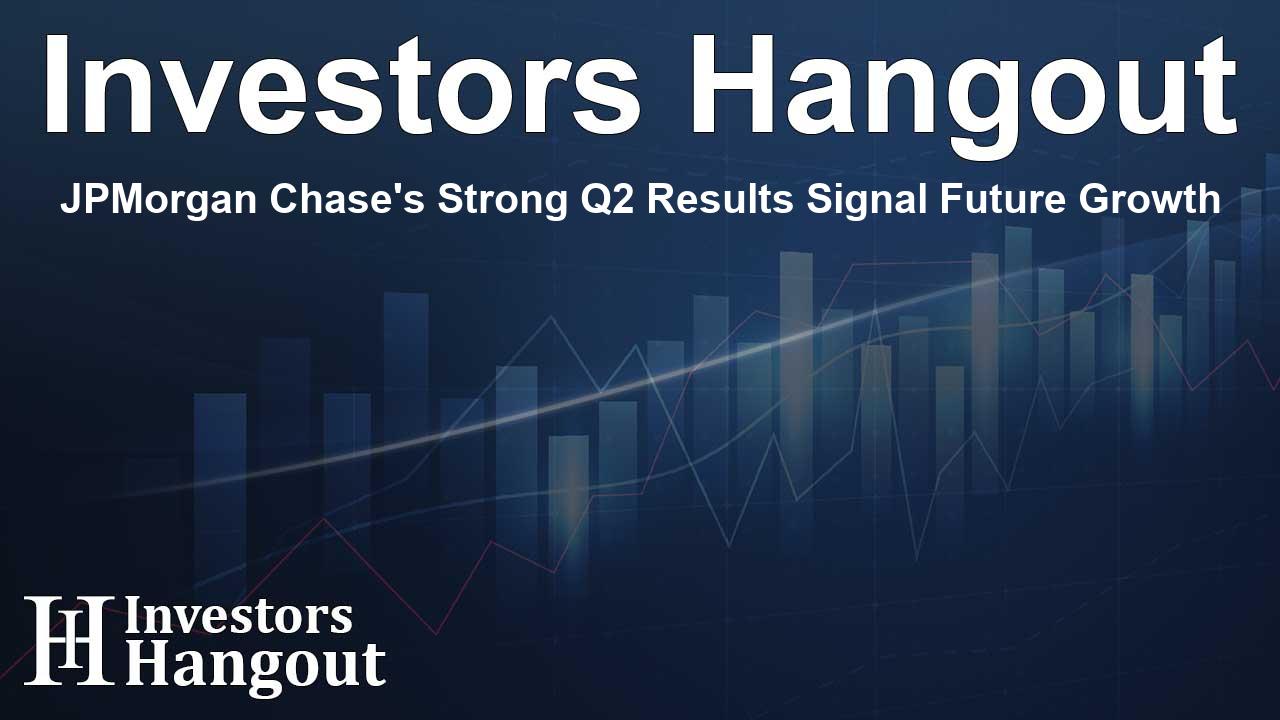JPMorgan Chase's Strong Q2 Results Signal Future Growth

JPMorgan Chase's Positive Q2 Performance
JPMorgan Chase (NYSE: JPM) recently released its second-quarter earnings report, presenting numerous insights. The standout aspect is the noticeable shift in tone by CEO Jamie Dimon. While he acknowledged existing risks, his comments reflected a more optimistic view on the U.S. economy's resilience and the overall financial landscape.
This indicates that while risks still loom, the company's health remains steadfast, and the prospects of favorable economic conditions are growing.
According to Dimon, "The U.S. economy displayed resilience this quarter. The finalization of tax reform and potential deregulation projects positive economic expectations, although significant risks remain, including trade uncertainties and high asset valuations."
Profitable Quarter Enhances Stock Price Outlook
Expectations for JPMorgan's stock were buoyant before the Q2 earnings release, and the results have only reinforced this positive outlook. Although there was some year-over-year revenue contraction, it was not as severe as anticipated, with encouraging performance in key areas. The overall banking system noted an average loan increase of 5%, coupled with a 6% rise in deposits. Even in the community banking segment, which experienced the most pronounced weakness, deposits decreased by only 1%, balanced by substantial growth in invested assets. Net interest income (NII) rose by 2%, despite a significant 20% drop in fee-based revenues.
The margins for JPMorgan were solid as well. The solid NII contributed to an impressive bottom line, delivering adjusted earnings of $4.96, which surpassed consensus estimates significantly, even after accounting for a $0.28 tax-related benefit.
The culmination of strong segments, revenue, and profits led to the company increasing its guidance, indicating better-than-expected top-line and bottom-line results, primarily fueled by robust NII.
Looking ahead, NII is poised to remain resilient through 2026, despite the Federal Open Market Committee's desire to reduce rates. The current inflation pace, as indicated by the latest Consumer Price Index data, is conflicting with these rate reduction goals.
Mid-July conditions reveal that there’s less than a 70% chance of two 25-basis-point cuts by year's end.
Robust Balance Sheet and Capital Return Strategies
JPMorgan's balance sheet remains sturdy, showcasing significant cash flow and built-in credit reserves, reminiscent of previous quarters. The capital ratios are strong, with the tier one ratio hovering at a commendable 15%, slightly below market consensus but comfortably above regulatory requirements.
Further strengthening their position, the company announced a 10% uptick in book value and $7 billion in share repurchases. For the second time this year, the board has opted to increase its dividend, resulting in a cumulative increase of 20%. This equates to an annualized return of nearly 2%, with further increases expected over time. These buybacks contribute around 0.9% to the market cap, providing a tailwind for market performance.
Analyst sentiment around the stock remains constructive. Although a few price target reductions were noted during Q2, they were balanced by upgrades and raises before the quarter ended.
The strong analyst coverage at 22, coupled with firming sentiment, illustrates a positive trend. The projected price target suggests a 13% upside from the pre-release close, potentially achievable before the end of 2025.
Furthermore, institutional interest has aligned with this upward trend, as institutions now control over 70% of the company's shares, indicating strong buying momentum moving into 2025.
Frequently Asked Questions
What did JPMorgan's Q2 earnings report indicate?
The report showed resilience in the U.S. economy with solid earnings, despite some revenue contraction.
How did CEO Jamie Dimon's tone change in the latest report?
He shifted from expressing concern to highlighting a more optimistic view regarding economic resilience.
What are the expectations for JPMorgan's stock going forward?
The outlook remains positive with strong guidance on earnings and revenue growth anticipated.
What factors contribute to JPMorgan's stable performance?
Key factors include robust net interest income, strategic share repurchases, and increasing dividends.
How does institutional ownership affect JPMorgan's stock?
Institutional investors controlling over 70% of the stock suggest strong confidence and support for future growth.
About The Author
Contact Henry Turner privately here. Or send an email with ATTN: Henry Turner as the subject to contact@investorshangout.com.
About Investors Hangout
Investors Hangout is a leading online stock forum for financial discussion and learning, offering a wide range of free tools and resources. It draws in traders of all levels, who exchange market knowledge, investigate trading tactics, and keep an eye on industry developments in real time. Featuring financial articles, stock message boards, quotes, charts, company profiles, and live news updates. Through cooperative learning and a wealth of informational resources, it helps users from novices creating their first portfolios to experts honing their techniques. Join Investors Hangout today: https://investorshangout.com/
The content of this article is based on factual, publicly available information and does not represent legal, financial, or investment advice. Investors Hangout does not offer financial advice, and the author is not a licensed financial advisor. Consult a qualified advisor before making any financial or investment decisions based on this article. This article should not be considered advice to purchase, sell, or hold any securities or other investments. If any of the material provided here is inaccurate, please contact us for corrections.
